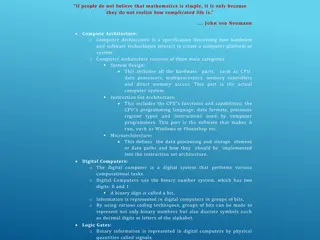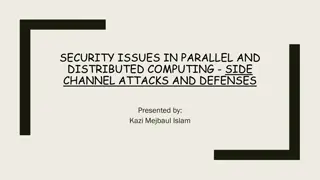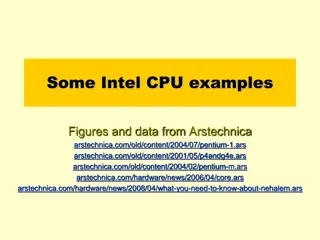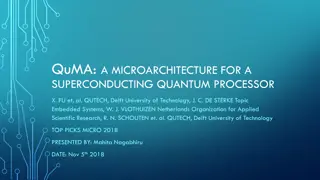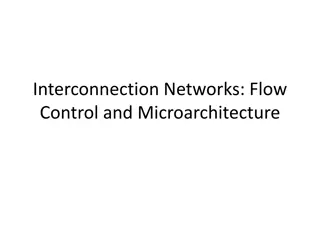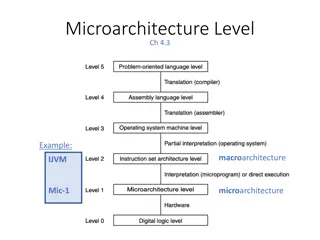Understanding Computer Architecture and Digital Circuits
Computer architecture encompasses system design, instruction set architecture, and microarchitecture, defining how hardware and software interact to create a computer platform. Digital computers operate using the binary number system and logic gates to process information. Hardware description langu
2 views • 8 slides
Security Issues in Parallel and Distributed Computing - Side Channel Attacks and Defenses
Explore various security threats in parallel and distributed computing, focusing on side channel attacks and defenses. Learn about microarchitecture, cache hierarchy, popular attacks, defense mechanisms, and more. Discover how hardware vulnerabilities can lead to the compromise of sensitive data and
1 views • 30 slides
Intel CPU Architectures Overview: Evolution and Features
Explore the evolution and key features of various Intel CPU architectures including Pentium, Core, and Pentium 4 series. Learn about the pipeline stages, instruction issue capabilities, branch prediction mechanisms, cache designs, and memory speculation techniques employed in these processors. Gain
0 views • 11 slides
Overview of QuMA: A Microarchitecture for a Superconducting Quantum Processor
This paper introduces QuMA, a quantum microarchitecture that bridges the gap between high-level algorithms and the quantum physical layer. It defines a multi-layered system stack for quantum computers, focusing on compiler support, quantum error correction, and the need for a micro-architecture fram
0 views • 21 slides
Understanding Interconnection Networks, Flow Control, and Microarchitecture
Interconnection networks play a crucial role in determining the flow control and routing paths within a network, impacting throughput and latency. Different switching techniques like circuit-switching, packet-based, and flit-based control the allocation of resources at various granularities. Circuit
0 views • 41 slides
Understanding the IJVM Microarchitecture: Overview and Instruction Set
The IJVM microarchitecture, specifically the Mic-1 microarchitecture, operates using a memory model where no memory addresses are used directly at the ISA level. This model includes areas such as the Constant Pool, Local Variable Frame, Operand Stack, and Method Area. Additionally, the IJVM Instruct
0 views • 10 slides
